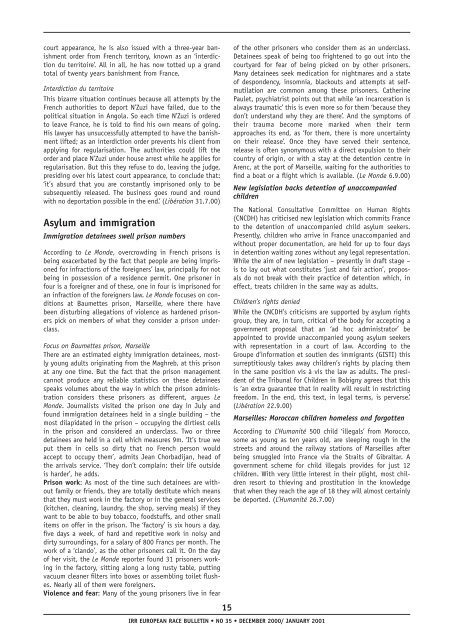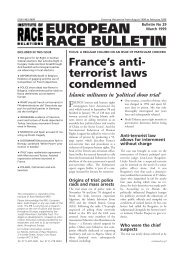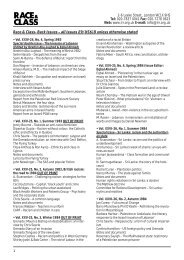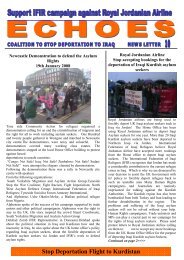EUROPEAN RACE BULLETIN - Institute of Race Relations
EUROPEAN RACE BULLETIN - Institute of Race Relations
EUROPEAN RACE BULLETIN - Institute of Race Relations
Create successful ePaper yourself
Turn your PDF publications into a flip-book with our unique Google optimized e-Paper software.
court appearance, he is also issued with a three-year banishmentorder from French territory, known as an ‘interdictiondu territoire’. All in all, he has now totted up a grandtotal <strong>of</strong> twenty years banishment from France.Interdiction du territoireThis bizarre situation continues because all attempts by theFrench authorities to deport N’Zuzi have failed, due to thepolitical situation in Angola. So each time N’Zuzi is orderedto leave France, he is told to find his own means <strong>of</strong> going.His lawyer has unsuccessfully attempted to have the banishmentlifted; as an interdiction order prevents his client fromapplying for regularisation. The authorities could lift theorder and place N’Zuzi under house arrest while he applies forregularisation. But this they refuse to do, leaving the judge,presiding over his latest court appearance, to conclude that:‘it’s absurd that you are constantly imprisoned only to besubsequently released. The business goes round and roundwith no deportation possible in the end.’ (Libération 31.7.00)Asylum and immigrationImmigration detainees swell prison numbersAccording to Le Monde, overcrowding in French prisons isbeing exacerbated by the fact that people are being imprisonedfor infractions <strong>of</strong> the foreigners’ law, principally for notbeing in possession <strong>of</strong> a residence permit. One prisoner infour is a foreigner and <strong>of</strong> these, one in four is imprisoned foran infraction <strong>of</strong> the foreigners law. Le Monde focuses on conditionsat Baumettes prison, Marseille, where there havebeen disturbing allegations <strong>of</strong> violence as hardened prisonerspick on members <strong>of</strong> what they consider a prison underclass.Focus on Baumettes prison, MarseilleThere are an estimated eighty immigration detainees, mostlyyoung adults originating from the Maghreb, at this prisonat any one time. But the fact that the prison managementcannot produce any reliable statistics on these detaineesspeaks volumes about the way in which the prison administrationconsiders these prisoners as different, argues LeMonde. Journalists visited the prison one day in July andfound immigration detainees held in a single building – themost dilapidated in the prison – occupying the dirtiest cellsin the prison and considered an underclass. Two or threedetainees are held in a cell which measures 9m. ‘It’s true weput them in cells so dirty that no French person wouldaccept to occupy them’, admits Jean Chorbadijan, head <strong>of</strong>the arrivals service. ‘They don’t complain: their life outsideis harder’, he adds.Prison work: As most <strong>of</strong> the time such detainees are withoutfamily or friends, they are totally destitute which meansthat they must work in the factory or in the general services(kitchen, cleaning, laundry, the shop, serving meals) if theywant to be able to buy tobacco, foodstuffs, and other smallitems on <strong>of</strong>fer in the prison. The ‘factory’ is six hours a day,five days a week, <strong>of</strong> hard and repetitive work in noisy anddirty surroundings, for a salary <strong>of</strong> 800 Francs per month. Thework <strong>of</strong> a ‘clando’, as the other prisoners call it. On the day<strong>of</strong> her visit, the Le Monde reporter found 31 prisoners workingin the factory, sitting along a long rusty table, puttingvacuum cleaner filters into boxes or assembling toilet flushes.Nearly all <strong>of</strong> them were foreigners.Violence and fear: Many <strong>of</strong> the young prisoners live in fear15<strong>of</strong> the other prisoners who consider them as an underclass.Detainees speak <strong>of</strong> being too frightened to go out into thecourtyard for fear <strong>of</strong> being picked on by other prisoners.Many detainees seek medication for nightmares and a state<strong>of</strong> despondency, insomnia, blackouts and attempts at selfmutilationare common among these prisoners. CatherinePaulet, psychiatrist points out that while ‘an incarceration isalways traumatic’ this is even more so for them ‘because theydon’t understand why they are there’. And the symptoms <strong>of</strong>their trauma become more marked when their termapproaches its end, as ‘for them, there is more uncertaintyon their release’. Once they have served their sentence,release is <strong>of</strong>ten synonymous with a direct expulsion to theircountry <strong>of</strong> origin, or with a stay at the detention centre inArenc, at the port <strong>of</strong> Marseille, waiting for the authorities t<strong>of</strong>ind a boat or a flight which is available. (Le Monde 6.9.00)New legislation backs detention <strong>of</strong> unaccompaniedchildrenThe National Consultative Committee on Human Rights(CNCDH) has criticised new legislation which commits Franceto the detention <strong>of</strong> unaccompanied child asylum seekers.Presently, children who arrive in France unaccompanied andwithout proper documentation, are held for up to four daysin detention waiting zones without any legal representation.While the aim <strong>of</strong> new legislation – presently in draft stage –is to lay out what constitutes ‘just and fair action’, proposalsdo not break with their practice <strong>of</strong> detention which, ineffect, treats children in the same way as adults.Children’s rights deniedWhile the CNCDH’s criticisms are supported by asylum rightsgroup, they are, in turn, critical <strong>of</strong> the body for accepting agovernment proposal that an ‘ad hoc administrator’ beappointed to provide unaccompanied young asylum seekerswith representation in a court <strong>of</strong> law. According to theGroupe d’information et soutien des immigrants (GISTI) thissurreptitiously takes away children’s rights by placing themin the same position vis à vis the law as adults. The president<strong>of</strong> the Tribunal for Children in Bobigny agrees that thisis ‘an extra guarantee that in reality will result in restrictingfreedom. In the end, this text, in legal terms, is perverse.’(Libération 22.9.00)Marseilles: Moroccan children homeless and forgottenAccording to L’Humanité 500 child ‘illegals’ from Morocco,some as young as ten years old, are sleeping rough in thestreets and around the railway stations <strong>of</strong> Marseilles afterbeing smuggled into France via the Straits <strong>of</strong> Gibraltar. Agovernment scheme for child illegals provides for just 12children. With very little interest in their plight, most childrenresort to thieving and prostitution in the knowledgethat when they reach the age <strong>of</strong> 18 they will almost certainlybe deported. (L’Humanité 26.7.00)IRR <strong>EUROPEAN</strong> <strong>RACE</strong> <strong>BULLETIN</strong> • NO 35 • DECEMBER 2000/ JANUARY 2001










